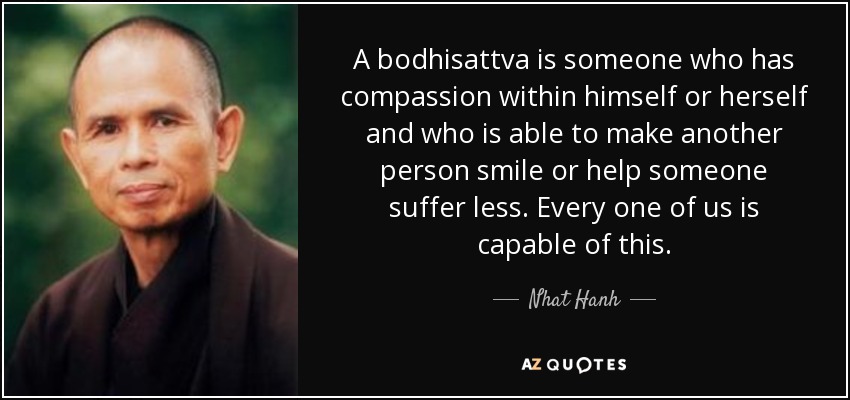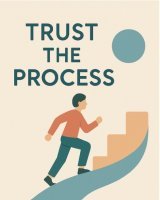Shantideva - The Way Of The Bodhisattva
Walking The Path Of Compassion

Shantideva the 8th century Indian Buddhist sage is famous for his treatise "The Way of the Bodhisattva" delivered as an extended teaching to the monks at the Buddhist university of Nalanda monastery.
Over the last 1,500 years Buddhist scholars and teachers have discussed at length the finer points of his teachings but at heart this classic Buddhist work can best be considered an "...essential guidebook on the ideal of compassion and the methods of attaining it". [Pema Chödrön]
In Buddhist terminology a "Bodhisattva" is someone who has taken a vow to put others first and to postpone his/her entry to Nirvana [a permanent state of enlightenment] until all other sentient beings have achieved enlightenment.
What Does This Really Mean?
This all sounds very worthy and dramatic, but what does this really mean in practice?
In my view there is an inherent faultline in the teachings of Buddhism and other major world religions, and it is this: ultimately its nearly all just words and concepts. They have practical value to the extent that they show us exactly what we can do, what steps we can take, to transform ourselves and our direct experience of life.
The cutting edge of this teaching from Shantideva is how you and I choose to live right now.
Commitment To Others
His Holiness the Dalai Lama, commenting on the text suggests says the real heart of Buddhism is complete commitment to others:
"In his famed text 'The Way of the Bodhisattva', Shantideva states that all happiness and joy are the consequences of cherishing the well-being of other sentient beings, while all problems, tragedies and disasters are the consequences of self-cherishing attitudes."
The recently departed, greatly revered and saintly Vietnamese Zen Master Thich Nhaht Hanh describes the Bodhisattva as:

Compassion
The word compassion is derived from the Latin words "com pati" meaning to suffer with. It has been defined as an empathic understanding of a person's feelings, accompanied by
altruism, or a desire to act on that person's behalf.
In practical terms it is when you relate to someone’s situation, and you want to help them. You see someone having a hard time, and you show up beside them and offer a helping hand.
Compassion Is Good For All Involved
It is not only the recipient who benefits, so does the person who is behaving compassionately.
Alongside the spiritual benefits, there are many personal benefits to be derived from the
expression of compassion and some of these benefits
include:
-
Increasing feelings of social
connection
- A broadening ability to see a wider perspective outside of oneself
- A buffering effect against stress
- Increased perceptions of happiness
- An experience of pleasure
- An increase in longevity
- Reduced levels of cellular inflammation
Let's briefly consider 3 key takeaways from Shantideva
- The mindset of compassion
- The foundation of compassion
- The action of compassion
Shantideva - [1] The MINDSET Of Compassion Is Surrender

Surrender is often referred to as dying to self in the Christian tradition and dropping the ego in Buddhism.
This is about correcting the inbuilt, hardwired tendency to assume that everything revolves around me.
Dying to self and dropping the ego is not a one-time experience but a frequent activity that should be undertaken at least daily and often many times throughout the day.
It is a practice and it grows with focused attention and repetition.
Surrender occurs quite naturally when you quieten your mind with mindfulness practice and shift your focus away from yourself by putting someone else first and acting in a selfless way.
This practice is echoed in other major traditions.
In the Tao we are advised:
"If You Want To Be Given Everything, Give Everything Up." [Tao Te Ching [22]]
The Bible says:
"Whoever seeks to preserve his life will lose it, but whoever loses his life will keep it." [Gospel of Luke 17.33]
Shantideva - [2] The FOUNDATION Of Compassion Is Mindfulness

The practise of mindfulness will enable you:
- To witness or observe (without narrative or analysis) the recurring or autonomic nature of your thoughts and feelings.
- To watch how your very own inner "personal-map-of-reality" filters your interpretation of your experience.
- To see how you become immersed in and identified with your thoughts and feelings.
- To learn how to stop thinking – to turn your thoughts off - at will.
Thich Nhat Hanh gave us a lucid and profound explanation that defines nirvana as the cessation of all suffering, and how our suffering comes from our wrong perceptions.
He explains how the practise of mindfulness can enable us to look deeply and remove our wrong perceptions.
Shantideva - [3] The ACTION Of Compassion Is Engagement

"I can't cope with life, I just don't want to live any more," says a woman's softly spoken voice. "Nobody has listened, I just want to go to sleep and not wake up."
Mick, head in hands, tries to reassure her.
"I
know that feeling," says Mick, "but there is a light that is stronger
than the darkness...
"I just don't want to live, Mick, I'm in a dark tunnel and can't get out," says the woman.
He pleads with her. "There's always hope..."
Mick wants others who have had troubles to find hope - just like he has.
In his 20s, Mick was a drug dealer consumed by cocaine and violence. He has now found faith and feeds the poor at his "Church On The Street" in Burnley, UK.
Pastor Mick is a good example of the engagement of compassion.
Be The Light At The End Of Someone Else's Tunnel Of Darkness

To be the light at the end of someone else's tunnel of darkness means to offer hope, encouragement, kindness and compassion to someone else who needs it.
His Holiness The Dalia Lama makes the point that it is in our self interest to do this:
"Even from the point of view of our own self-interest, if others are happy and satisfied, then we ourselves can also be happy.
If you want others to be happy, practice compassion. If you want to be happy, practice compassion."
He continues:
"Furthermore, based on our own personal experience, we can observe that the more we hold on to a strong sense of self—cherishing our own self-interest—the greater our own emotional and psychological problems."
On Becoming The Ferryman

"Compassion is threatening to the ego. We might think of it as something warm and soothing, but actually it’s very raw.
When we set out to support other beings, when we go so far as to stand in their shoes, when we aspire to never close down to anyone, we quickly find ourselves in the uncomfortable territory of 'life not on my terms'.” [Pema Chödrön]
The traditional life of The Ferryman is all about transporting passengers from one side of a river or estuary to the other. He is needed where the water is too deep for a crossing on foot and where there is no bridge.
In literature and mythology he is often seen as an agent of transition from life to death.
In Buddhist thought and teaching The Ferryman is a metaphor for the Bodhisattva as a champion of compassion.
- The Ferryman knows that we all cross the river of life together, that we are all in the same boat, we are all fundamentally want the same things.
- The attitude of The Ferryman is that the pain that usually drags you down and causes you to withdraw into yourself is the stepping-stone for awakening your compassion and your understanding of the pain of others.
- The Ferryman seeks the best in all people and does his or her best to help everyone open to their true nature together.
Applying Shantideva - One Step At A Time

- The path of compassion is altruistic but not idealistic.
- Walking this path we are not asked to lay down our life, find a solution for all of the struggles in this world, or immediately rescue all beings.
- The path of compassion is cultivated one step and one moment at a time.
- Each of those steps lessens mountains of sorrow in the world.
Further Reading:
5 Zen Mindsets For Mastery - In Any Area Of Your Life
Tao Te Ching - Connecting To Your True Source Of Power
Return from "Shantideva" to: Walking The Talk
LATEST ARTICLES
The Battle For Your Mind - How To Win Inner Freedom In A Digital Age Of Distraction
 From External Events to Inner Events. We often think of “events” as things that happen out there: the traffic jam, the rude comment, the delayed email reply. But what truly shapes our experience is wh…
From External Events to Inner Events. We often think of “events” as things that happen out there: the traffic jam, the rude comment, the delayed email reply. But what truly shapes our experience is wh…How to See Your Thoughts Without Becoming the Story
 A Practical Guide to Thought-Awareness. You can spend your life inside the stories of your mind without ever learning how to see your thoughts clearly and objectively. Most of the stuff we tell oursel…
A Practical Guide to Thought-Awareness. You can spend your life inside the stories of your mind without ever learning how to see your thoughts clearly and objectively. Most of the stuff we tell oursel…The Collison Decision Matrix - A Simple Framework for Better Choices
 The Collison Decision Matrix Is A Practical Everyday Thinking Tool. Most of us spend a surprising amount of time worrying about decisions. From small ones such as what to wear, what to eat, what to te…
The Collison Decision Matrix Is A Practical Everyday Thinking Tool. Most of us spend a surprising amount of time worrying about decisions. From small ones such as what to wear, what to eat, what to te…The Power Of Asking The Right Question
 The Power Of Asking The Right Question Lies In The Quest For Insight. To experience the power of asking the right question you must develop the practice of asking questions. The best way to improve th…
The Power Of Asking The Right Question Lies In The Quest For Insight. To experience the power of asking the right question you must develop the practice of asking questions. The best way to improve th…Site Pathways
 Here is a site pathway to help new readers of Zen-Tools navigate the material on this site. Each pathway is based around one of the many key themes covered on this site and contain a 150 word introduc…
Here is a site pathway to help new readers of Zen-Tools navigate the material on this site. Each pathway is based around one of the many key themes covered on this site and contain a 150 word introduc…How To Live With Contradiction - Beyond Thought Let Stillness Speak
 A major impact on so many peoples' lives is the situational contradiction of unfilled realistic expectations. So where does all this leave us? Well here we are, with mental equipment that is more lim…
A major impact on so many peoples' lives is the situational contradiction of unfilled realistic expectations. So where does all this leave us? Well here we are, with mental equipment that is more lim…How To Trust The Process Of Mindfulness - Right Now
 In mindfulness, the process isn’t some distant goal — it's what is happening right now. When we talk about how to trust the process of mindfulness the credibility of the process is heavily dependent…
In mindfulness, the process isn’t some distant goal — it's what is happening right now. When we talk about how to trust the process of mindfulness the credibility of the process is heavily dependent…Inner Mastery For Outer Impact - Mental Clarity For Effective Action
 Insights only matter if they translate into consistent action. In a world crowded with quick fixes and motivational soundbites, the theme “Inner Mastery for Outer Impact” calls us to something more e…
Insights only matter if they translate into consistent action. In a world crowded with quick fixes and motivational soundbites, the theme “Inner Mastery for Outer Impact” calls us to something more e…The Wise Advocate - Helping You Achieve The Very Best Outcome
 The focus of your attention in critical moments of choice either builds or restricts your capacity for achieving the best outcome. When we talk of 'The Wise Advocate' its easy to think of the consigl…
The focus of your attention in critical moments of choice either builds or restricts your capacity for achieving the best outcome. When we talk of 'The Wise Advocate' its easy to think of the consigl…Trust The Process - Beyond The Cliche
 The phrase "trust the process" has become a cliche, the woo-woo mantra of the "self help" industry. Those three little words feel like they ought to mean something useful but hidden behind them are a…
The phrase "trust the process" has become a cliche, the woo-woo mantra of the "self help" industry. Those three little words feel like they ought to mean something useful but hidden behind them are a…The Dopamine Delusion - Why Anticipation Beats Achievement
 The thrill we feel is not in the having, but in the wanting. The more we have, the more we want. The more things we acquire and the easier things get for us, the more discontent we feel. The more spo…
The thrill we feel is not in the having, but in the wanting. The more we have, the more we want. The more things we acquire and the easier things get for us, the more discontent we feel. The more spo…The Power Of Silence Is Experienced In Your Use Of Language
 Practise the "Beneficial Neurological Delay" for optimal comprehension. The power of silence is experienced in your use of language, specifically: - How you formulate the words you use to think and in…
Practise the "Beneficial Neurological Delay" for optimal comprehension. The power of silence is experienced in your use of language, specifically: - How you formulate the words you use to think and in…